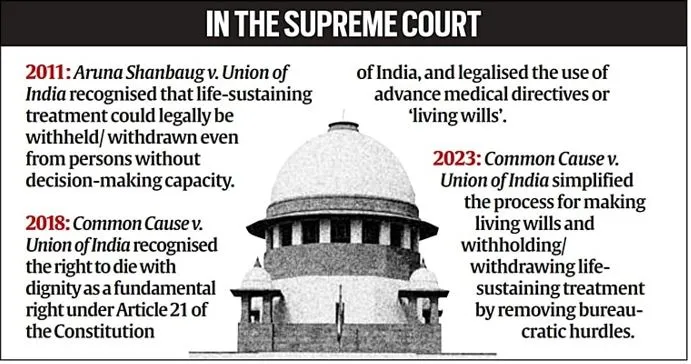

3rd February 2025 (12 Topics)
Context
Karnataka has taken a landmark step in facilitating the right to die with dignity to implement the Supreme Court’s 2023 directive, becoming the first state to do so.
Background
- This move is in line with the Supreme Court’s 2023 ruling, which affirmed that the Right to Life under Article 21 of the Constitution also includes the right to die with dignity (Withdrawal of Life-Sustaining Therapy (WLST)).
- Supreme Court has held that if a patient is terminally ill and is undergoing prolonged medical treatment with no hope of recovery and cure of the ailment, and does not have decision-making capacity, then WLST may be appropriate, in accordance with the prescribed procedure.
- In response to this, the Karnataka government has taken proactive steps to implement a system that formalizes the process of passive euthanasia through Advance Medical Directives (AMD), also known as living wills.
What is Withdrawing Life-Sustaining Treatment?
- Withholding or withdrawing life-sustaining treatment refers to stopping medical interventions such as ventilators, feeding tubes, and other artificial means that help maintain vital bodily functions.
- This decision is made when these treatments no longer improve the patient's condition or when they only serve to prolong suffering.
- Difference Between Withdrawing Life Support and Euthanasia
- Withdrawing Life-Sustaining Treatment (Passive Euthanasia): This involves stopping treatment when it is no longer beneficial, and the patient is in a terminal state. The patient is allowed to die naturally, with pain relief and comfort care provided.
- Euthanasia: This is the intentional act of ending a patient's life to relieve suffering, typically administered by a doctor. It is not legal in India unless passive euthanasia is followed as per the defined guidelines.
What is an Advance Medical Directive (AMD)?
- An Advance Medical Directive (AMD), or living will, is a legal document in which a person outlines their wishes regarding medical treatment in case they become terminally ill or are unable to communicate.
- This allows individuals to express their desires about life-sustaining treatments, such as whether or not they wish to be kept alive through artificial means in the event of severe illness or injury.
- The Karnataka order enables individuals to execute an AMD and register it with the local government or the healthcare establishment to ensure that their medical wishes are known and respected when the time comes.
- While living wills are legal in India, their adoption has been slow.
- The Supreme Court had allowed passive euthanasia in 2018, but with strict guidelines.
Implications of the Karnataka Order
- Dignified End-of-Life Care: The decision allows terminally ill patients to choose a dignified death by having their life-sustaining treatments withdrawn if there is no hope of recovery. This will provide much-needed relief for patients who may be suffering from debilitating conditions.
- Legal and Humane Framework: The Karnataka order establishes a humane, legally sanctioned process for passive euthanasia, which balances medical ethics and the patient's autonomy. It also ensures legal oversight to prevent misuse and to safeguard the rights of the patient.
- Progressive Step for Healthcare: By becoming the first state to implement such a framework, Karnataka is leading the way in upholding human rights and healthcare values, offering individuals greater control over their healthcare decisions.
|
Reasons for favouring passive euthanasia |
Arguments against euthanasia |
|
|
More Articles


